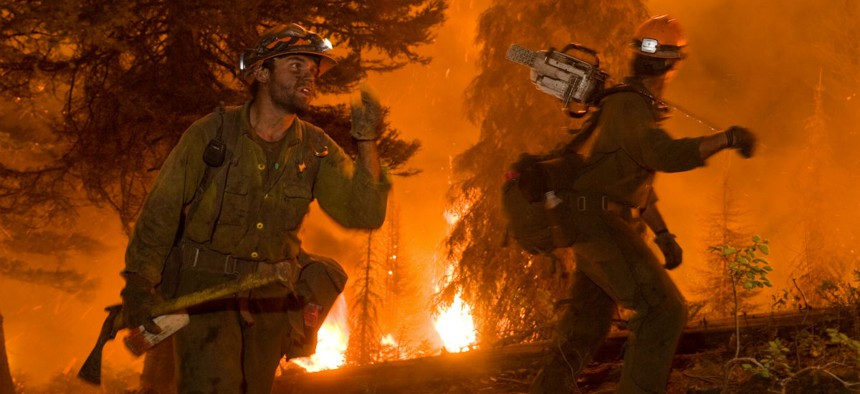
Kari Greer/U.S. Forest Service file photo
Congress' Lack of Long-Term Wildfire Funding Plan Leaves USDA Chief 'Deeply Disappointed'
Vilsack criticizes omnibus spending bill in wake of costliest fire season on record.
As Congress put final touches on the massive fiscal 2016 spending bill last week, Agriculture Secretary Tom Vilsack wrote to say he was “deeply disappointed” in the absence of long-term funding for Forest Service fire teams who battled record-setting flames this year.
“In 2015, more than 56,000 fires burned 9.8 million acres, leading to the costliest fire season on record,” he wrote on Dec. 17 to Sen. Barbara Mikulski, D-Md., and other appropriators from both parties in both chambers. “The cost of the Forest Service’s wildfire suppression reached a record $243 million in a one-week period during the height of suppression activity in August 2015.”
The $1.1 trillion bill did contain the base funding requested in President Obama’s budget in February as well as “modest” new funds for fire suppression, hazardous fuel reduction and forest management work, Vilsack acknowledged. But missing was a long-term funding plan that also contained management reforms that had been prepared by a bipartisan and bicameral set of members. “Had Congress enacted the final package being considered, the budget portions alone would have allowed the Forest Service to treat an estimated additional 1 million acres annually, producing another 300 million board feet annually,” he wrote.
Predicting “hotter, longer, more severe, and ultimately more costly fire seasons” in the future, Vilsack said the Forest Service “conservatively estimates that fire suppression will consume 67 percent of the Forest Service budget by 2025, a dramatic increase from 16 percent in 1995.” Already in fiscal 2015, the agency spent “well in excess of 60 percent of its budget on firefighting and fire-related activities,” a total of $1.7 billion.
Agriculture spokesman Matthew Herrick told Government Executive that Vilsack will no longer transfer funds from other agency accounts but will go back to Congress for new emergency funding in 2016 if the trend toward more wildfires continues. The transfers that have been going on for years directly impact the Forest Service’s “ability to fund other critical work such as restoration that can reduce wildfire threats; drinking water area protection; and recreation investments, not just in the West, but across the country,” he said via email. “We are just, literally, a few acres away from reaching the tragic milestone of the biggest wildfire season on record, and fires still burn even in late December.”







